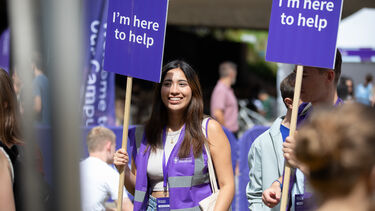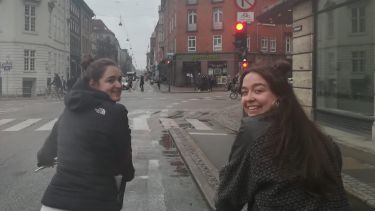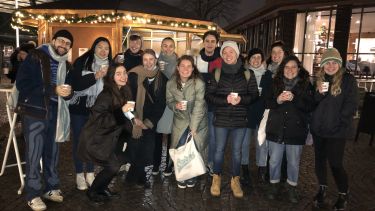Destined to live in Copenhagen

Why did you want to study abroad in Copenhagen?
Even before starting university, I knew I was destined to live in Copenhagen. After visiting with my sisters in 2019 I fell in love with the city – despite the fact that it did not stop raining the whole time we were there. So when I saw that the University of Copenhagen was one of the destinations offered on the Politics European Exchange programme I jumped at the opportunity, determined to get there. Throughout the application process I had to keep reminding myself that I might be unsuccessful in my pursuit of Copenhagen and researched the other universities available, as I wanted to ensure I was ready to study abroad. When I was offered Copenhagen, I was ecstatic, and soon began saving money to ensure I was able to live comfortably over there (as it isn’t the cheapest of places). The city is incredible! If you’re lucky enough to go there definitely get a bike, it is the cheapest and most convenient way of travelling.
How was studying in Copenhagen different to studying in Sheffield?
Being in Copenhagen allowed me to choose modules that aren't a part of my course here. I chose a selection of politics modules that covered subjects ranging from policy making, to feminism, to a profile on philosopher Walter Benjamin. It was interesting to see how the different university taught politics modules, but I felt that the workload was fairly similar to Sheffield, with both universities utilising a high level of independent study. There were different ways of being assessed, including written papers and less common oral exams.
What were your favourite topics to study in Copenhagen?
The politics I studied over there was very interesting, however the subjects that I enjoyed most were taken from the humanities faculty. I chose two 15 credit modules, rather than four 7.5 modules as I had done in the first semester. These were Contemporary Art and Danish Cinema. Being able to take these modules was a dream – I love film and art but wouldn't have been able to study them in my current degree so to be able to do this was incredible. With contemporary art we got to visit the museums with free tours from our academic professors, which was invaluable.
Did you get involved with anything outside of your studies?
There were so many opportunities with regards to extra-curricular activities and I managed to balance these with my academic commitments. Working with my professor, I was able to establish a Feminist Book Club. Each time we met, everyone voted on the book to read, then we gathered and discussed our thoughts over coffee and cake. I found activities like this to be helpful with enriching friendships outside of the classroom setting. The university also offered a mentor scheme for international students which was an excellent way to meet people in the early days. There were different events throughout the year which was a nice way to see the city as well. Whilst over there, I also took the opportunity to travel to other cities in Denmark – which is something I would recommend doing, don’t just limit yourself to the city you are in.
How has studying abroad helped you with your future career path?
Studying abroad has definitely changed my mindset on my future, it helped me realise that the world is too big to settle immediately into something after graduating and has spurred me on to travel the world. By doing this, I hope to enrich my life with experiences before eventually putting down roots and choosing a career. If I had not studied abroad, I feel that I would have lacked the confidence to do this. Being in a different country with people from all over the world was just the most amazing experience and something I would definitely push others to do.
Caitlin's top tips for studying abroad:
Find your people
My year abroad was hugely influenced by the people I shared it with. I don’t think I would have got through the year without them. In the first couple of weeks I would recommend trying to meet as many people as you can. By doing this, you have a wide net of people to choose from. You will find your people, I found it easier to initially make friends with other brits as you had accessible common ground, but DO NOT limit yourself to this. Some of my closest friends are now from all over Europe - brilliant for when you need accommodation. Remember that all the international students are in the same boat as you and just want to make friends and whilst you might feel alone, there will always be people to talk to!
Find your places
Once I had established solid friendships, we went on a search for our places. These were not necessarily the ‘tourist’ spots but places that we felt that we belonged – the equivalent of your local pub. I feel like this is necessary as you need places that are comforting, you’re in a far away country with no quick access to home, to have places that are ‘yours’ makes you feel a lot safer. This could be a bar, a park, or even someone’s house, just somewhere that is easy to exist in.
Bring your home comforts
Like with any year, there were days that were hard over there and all I would want was a bar of Cadbury’s Marvellous Creations. Unfortunately they are not available to buy in Denmark and the Danish equivalent just did not hit the same spot. However, I had luckily brought some in my bag and had begged my visitors to bring me some as well – to which they all obliged. Having those home comforts again is just helpful for the days when you’re not feeling your best.

Visit us
Discover what sets Sheffield apart at our undergraduate open days on Saturday 21 June and Saturday 5 July 2025.



